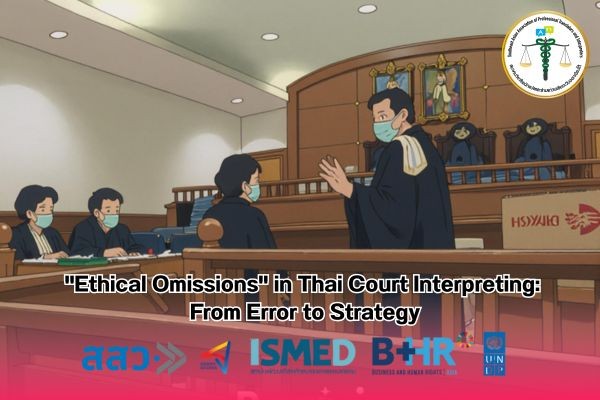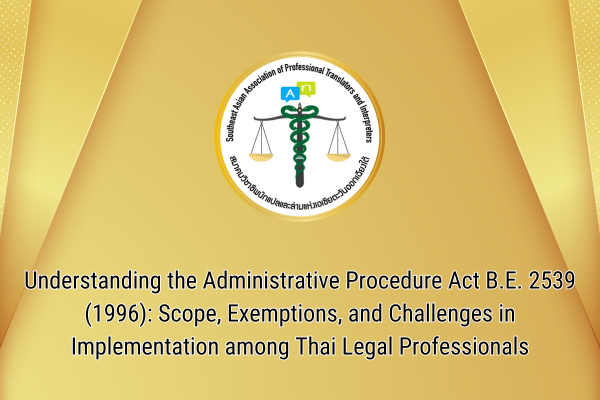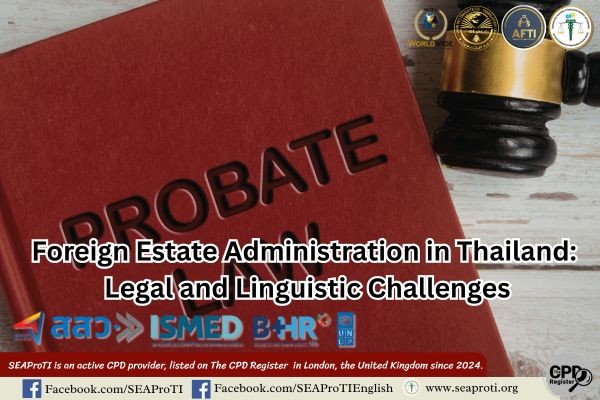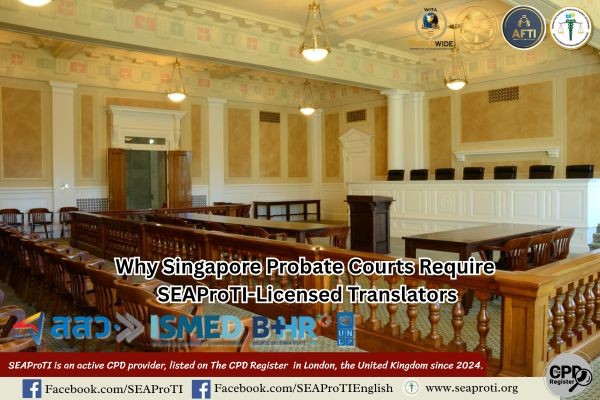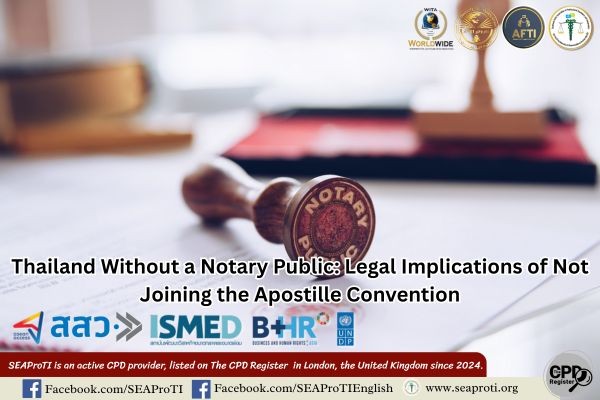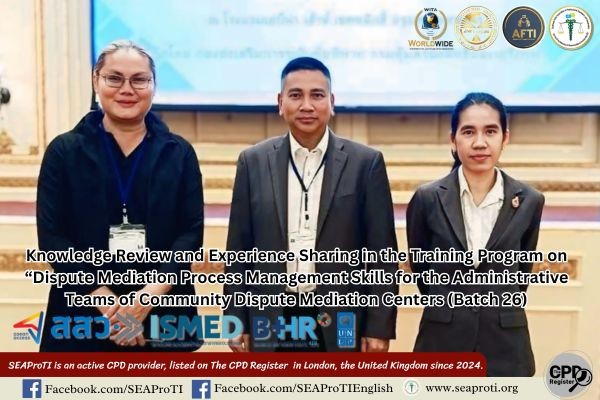“Ethical Omissions” in Thai Court Interpreting: From Error to Strategy
Author: Wanitcha Sumanat, the president of the Southeast Asian Association of Professional Translators and Interpreters
12 August 2025, Bangkok – Omission in court interpreting is often perceived as an error that reduces the completeness of the conveyed message (Gile, 2009). However, in certain cases, omissions may be ethically justified (Ethical Omissions), serving to maintain neutrality, prevent misunderstanding, and ensure the efficiency of court proceedings (Hale, 2004; Napier, 2004). Understanding the types of omissions and their application within the Thai judicial context is essential for enhancing the quality of interpreting and upholding justice.
Definition of Ethical Omissions
Ethical Omissions refer to the deliberate exclusion of certain elements from the source message during interpretation for professional and ethical reasons, rather than due to a lack of comprehension or skill. Examples include:
- Preventing serious misunderstandings by the court or parties
- Avoiding the use of language that violates dignity or fosters bias
- Maintaining interpreter neutrality
- Protecting personal data unrelated to the facts of the case
As Hale (2004) notes, omissions may sometimes involve restructuring information to reduce ambiguity or uncertainty, provided that the core meaning remains unchanged.
Types of Strategic Omissions (Adapted from Napier, 2004)
- Conscious strategic omission
Removing redundant or irrelevant content for conciseness, such as omitting repetitive greetings or ceremonial phrases in testimony.
- Bias-reducing omission
Reducing inflammatory or derogatory remarks to preserve the decorum of court proceedings.
- Cultural adaptation omission
Excluding or adapting culturally specific metaphors that cannot be accurately conveyed to the target audience.
- Confidentiality-driven omission
Skipping personal details unrelated to the substantive issues in the case.
Ethical Challenges
While Ethical Omissions may be well-intentioned, the line between “ethical omission” and “omission due to lack of understanding” can be blurred (Mikkelson, 2017). Court interpreters should therefore apply the following principles:
- Necessity – Is the omission intended to prevent harm or confusion?
- Transparency – Can the omission be explained to the court?
- Professional compliance – Is the omission consistent with the professional codes of conduct for Thai court interpreters?
Ethical vs. Non-Ethical Omissions in Thai Court Interpreting
| Dimension | Ethical Omissions | Non-Ethical Omissions |
|---|---|---|
| Definition | Deliberate omission to preserve clarity, neutrality, legal appropriateness, and cultural relevance without distorting meaning. | Omission due to error, limitations, or lack of understanding, resulting in loss or distortion of information. |
| Purpose | To prevent misunderstanding, reduce bias, or protect sensitive information unrelated to the case. | No strategic or ethical purpose; often caused by processing constraints or inadequate knowledge. |
| Typical Causes | – Repetitive or redundant wording- Inflammatory or derogatory language- Culturally specific references not understandable to the court- Protection of privacy | – High speech rate- Memory overload- Lack of legal terminology knowledge- Poor sound quality |
| Impact | Improves efficiency of proceedings and reduces bias without compromising the parties’ right to information. | May lead to incomplete or inaccurate information, affecting the fairness of proceedings. |
| Transparency | An interpreter can explain the rationale to the court. | The interpreter cannot provide a defensible justification. |
| Thai Court Examples | – Rendering profanity only once, with a note to the court that the term was repeated- Omitting an irrelevant witness phone number- Recasting a local idiom into an equivalent explanation to avoid misinterpretation | – Missing crucial details due to rapid speech- Forgetting part of a timeline due to short-term memory lapse- Not interpreting “witness protection measures” due to unfamiliarity with the term |
Examples in the Thai Court Context
- Repeated profanity: The interpreter renders the offensive term once, then informs the court that the speaker repeated the same word to reduce length and avoid psychological impact.
- Irrelevant personal information: Omitting a witness’s phone number or address when unrelated to the case.
- Local cultural metaphors: Replacing a metaphor like “like a tom yum pot spilling over” with a general explanation conveying the same meaning to avoid misinterpretation.
Conclusion
In Thai court interpreting, Ethical Omissions can serve as a strategic tool when applied cautiously and with clear ethical reasoning, ensuring that the right to full access to facts is preserved. Training interpreters to distinguish and manage such omissions is vital for raising professional standards in the Thai judicial process.
References
- Barik, H. C. (1975). Simultaneous interpretation: Qualitative and linguistic data. Language and Speech, 18(3), 272–297. https://doi.org/10.1177/002383097501800305
- Gile, D. (2009). Basic concepts and models for interpreter and translator training (Rev. ed.). John Benjamins. https://doi.org/10.1075/btl.8
- Hale, S. (2004). The discourse of court interpreting: Discourse practices of the law, the witness and the interpreter. John Benjamins. https://doi.org/10.1075/btl.52
- Mikkelson, H. (2017). Introduction to court interpreting (2nd ed.). Routledge. https://doi.org/10.4324/9781315660128
- Napier, J. (2004). Interpreting omissions: A new perspective. Interpreting, 6(2), 117–142. https://doi.org/10.1075/intp.6.2.03nap
About SEAProTI Certified Translators, Certification Providers, and Interpreters
The Southeast Asian Association of Professional Translators and Interpreters (SEAProTI) has published official guidelines and eligibility criteria for individuals seeking registration as Certified Translators, Translation Certification Providers, and Certified Interpreters under Chapter 9 and Chapter 10 of the Royal Thai Government Gazette, issued by the Secretariat of the Cabinet, Office of the Prime Minister, on 25 July 2024 (Vol. 141, Part 66 Ng, p. 100). Full text available at: The Royal Thai Government Gazette
Headquarters: 33 Baan Rajakhru Building, Room 402, Soi Phahonyothin 5, Phahonyothin Road, Phayathai Sub-district, Phayathai District, Bangkok 10400 Email: hello@seaproti.com Tel: (+66) 2-114-3128 (Office Hours: 9.00–17.00 HRs/Monday to Friday)
การ “ละไว้เพื่อไม่แปล” (Ethical Omissions) ในงานล่ามศาลไทย: จากความผิดพลาดสู่กลยุทธ์
ผู้แต่ง วณิชชา สุมานัส นายกสมาคมวิชาชีพนักแปลและล่ามแห่งเอเชียตะวันออกเฉียงใต้
12 สิงหาคม 2568, กรุงเทพมหานคร – ในงานล่ามศาลไทย “การละ” (Omission) มักถูกมองว่าเป็นข้อบกพร่องที่ลดทอนความครบถ้วนของการสื่อสารระหว่างคู่ความและศาล อย่างไรก็ตาม ในทางปฏิบัติ มีบางกรณีที่ “การละ” ไม่ได้เกิดจากความผิดพลาด แต่เป็นการตัดสินใจเชิงจริยธรรม (Ethical Decision) เพื่อรักษาความชัดเจน ความเป็นกลาง และความถูกต้องของกระบวนพิจารณา ซึ่งในทางสากลเรียกว่า Ethical Omissions
แนวคิดนี้มองว่าล่ามอาจ “ละ” บางองค์ประกอบออกได้ หากการถ่ายทอดตรงตัวจะสร้างความสับสน บิดเบือนเจตนา หรือขัดต่อมาตรฐานทางกฎหมายและจริยธรรม
ความหมายของ Ethical Omissions
Ethical Omissions หมายถึง การละข้อความหรือองค์ประกอบบางส่วนในระหว่างการล่ามโดยมีเหตุผลด้านจริยธรรมและวิชาชีพ เช่น
- เพื่อป้องกันความเข้าใจผิดร้ายแรง
- เพื่อคงไว้ซึ่งความเป็นกลางของล่าม
- เพื่อหลีกเลี่ยงการเผยแพร่ถ้อยคำที่ขัดต่อกฎหมายหรือหลักความสุภาพในศาล
- เพื่อปกป้องสิทธิของพยานหรือคู่ความ (เช่น ข้อมูลส่วนบุคคลหรือความลับทางการแพทย์)
สาเหตุของการละในเชิงกลยุทธ์
ปรับจากแนวคิดของ Napier (2004) และประสบการณ์ในศาลไทย การละเชิงกลยุทธ์ในบริบท Ethical Omissions อาจมีสาเหตุดังนี้:
- การละเชิงกลยุทธ์โดยตั้งใจ (Conscious Strategic Omission)
- ล่ามตัดข้อความที่ไม่จำเป็นหรือซ้ำซ้อน เช่น คำสบถที่ไม่เกี่ยวข้องกับสาระสำคัญ เพื่อคงโฟกัสในประเด็นกฎหมาย
- การละเพื่อลดอคติและความร้อนแรงของถ้อยคำ
- เช่น ลดทอนถ้อยคำที่ใช้เพื่อยั่วยุหรือดูหมิ่น ซึ่งอาจส่งผลต่อบรรยากาศการพิจารณา
- การละเนื่องจากความต่างเชิงวัฒนธรรม
- เช่น คำอุปมา/สำนวนท้องถิ่นที่ไม่มีความหมายในวัฒนธรรมผู้ฟัง และหากแปลตรงตัวจะทำให้เกิดความเข้าใจผิด
- การละเพื่อปกป้องความลับหรือความเป็นส่วนตัว
- เช่น ตัดข้อมูลส่วนบุคคลที่ไม่เกี่ยวข้องกับประเด็นคดีออกระหว่างการแปลสด
ความท้าทายด้านจริยธรรม
แม้ Ethical Omissions จะมีเหตุผลสนับสนุน แต่ก็ต้องอาศัยการตัดสินใจอย่างรอบคอบ เพราะ:
- การละเกินความจำเป็น อาจกระทบต่อสิทธิในการรับรู้ข้อเท็จจริงของคู่ความ
- ศาลอาจมองว่าล่ามไม่ถ่ายทอดครบถ้วน
- เส้นแบ่งระหว่าง “ละเพื่อจริยธรรม” กับ “ละเพราะไม่เข้าใจ” บางครั้งคลุมเครือ
ดังนั้น ล่ามศาลไทยควรมีหลักพิจารณา เช่น
- ความจำเป็น – การละนั้นป้องกันความเสียหายหรือความสับสนหรือไม่
- ความโปร่งใส – สามารถอธิบายเหตุผลของการละต่อศาลได้หรือไม่
- ความสอดคล้องกับมาตรฐานวิชาชีพ – เป็นไปตามหลักจรรยาบรรณล่ามศาลหรือไม่
ตัวอย่างในบริบทศาลไทย
- กรณีการใช้ถ้อยคำหยาบคายซ้ำๆ โดยจำเลยในศาล ล่ามอาจถ่ายทอดเพียงครั้งแรก แล้วแจ้งต่อศาลว่าผู้พูดใช้ถ้อยคำซ้ำเพื่อลดความยาวและไม่กระทบต่อบรรยากาศการพิจารณา
- กรณีข้อมูลส่วนบุคคลที่ไม่เกี่ยวข้องกับข้อเท็จจริง เช่น ที่อยู่หรือหมายเลขโทรศัพท์ของพยาน ที่ไม่มีความเกี่ยวข้องกับประเด็นพิพาท
- กรณีคำเปรียบเปรยทางวัฒนธรรม ที่ถ้าถ่ายทอดตรงตัวจะทำให้ศาลเข้าใจผิดในสาระสำคัญ
ตารางเปรียบเทียบ Ethical Omissions กับ Non-Ethical Omissions ในงานล่ามศาลไทย
| ประเด็นเปรียบเทียบ | Ethical Omissions (การละเชิงจริยธรรม) | Non-Ethical Omissions (การละที่ไม่สอดคล้องจริยธรรม) |
|---|---|---|
| คำนิยาม | การละข้อความโดยตั้งใจ เพื่อรักษาความชัดเจน ความเป็นกลาง และความเหมาะสมทางกฎหมายและวัฒนธรรม โดยไม่บิดเบือนสาระสำคัญ | การละข้อความเนื่องจากข้อผิดพลาด ข้อจำกัด หรือขาดความเข้าใจ อาจทำให้ข้อมูลขาดหายหรือผิดความหมาย |
| วัตถุประสงค์ | เพื่อป้องกันความเข้าใจผิด ลดอคติ หรือปกป้องข้อมูลอ่อนไหวที่ไม่เกี่ยวข้องกับคดี | ไม่มีวัตถุประสงค์เชิงกลยุทธ์หรือจริยธรรม มักเกิดจากความบกพร่องหรือสภาพแวดล้อม |
| ตัวอย่างสาเหตุ | – ลดถ้อยคำยั่วยุ/หยาบคายที่ซ้ำซ้อน- ตัดข้อมูลส่วนบุคคลไม่เกี่ยวข้อง- ปรับถ้อยคำวัฒนธรรมเฉพาะถิ่นที่ศาลไม่เข้าใจ | – ฟังไม่ทันเพราะผู้พูดพูดเร็ว- จำเนื้อหาไม่ได้เพราะข้อมูลยาวเกินความจำ- ไม่เข้าใจคำศัพท์กฎหมายเฉพาะ |
| ผลกระทบ | ช่วยให้การพิจารณามีประสิทธิภาพและลดความเสี่ยงต่ออคติ โดยไม่กระทบต่อสิทธิรับรู้ข้อเท็จจริง | อาจทำให้ศาลหรือคู่ความได้รับข้อมูลไม่ครบถ้วน กระทบความถูกต้องของการพิจารณา |
| ความโปร่งใส | สามารถอธิบายต่อศาลได้ว่าการละมีเหตุผลเชิงจริยธรรม | ไม่สามารถอธิบายหรือให้เหตุผลที่ยอมรับได้ |
| ตัวอย่างในศาลไทย | – พยานใช้คำสบถซ้ำๆ (“ไอ้…”) ล่ามถ่ายทอดเพียงครั้งแรกและแจ้งศาลว่าผู้พูดใช้ถ้อยคำซ้ำ- ตัดหมายเลขโทรศัพท์ของพยานที่ไม่เกี่ยวข้องกับคดี- ปรับคำเปรียบเทียบท้องถิ่น (“เหมือนต้มยำกุ้งแตกหม้อ”) เป็นคำอธิบายทั่วไปที่สื่อความหมายเดียวกัน | – ล่ามข้ามข้อมูลสำคัญเพราะผู้พูดพูดเร็วเกินไป- ลืมถ่ายทอดรายละเอียดเหตุการณ์เพราะความจำสั้นในขณะล่าม- ไม่เข้าใจคำว่า “มาตรการคุ้มครองพยาน” และจึงไม่แปล |
บทสรุป
การ “ละไว้เพื่อไม่แปล” หรือ Ethical Omissions ในงานล่ามศาลไทย เป็นดาบสองคมที่ต้องใช้อย่างรอบคอบและมีเหตุผลด้านจริยธรรมที่ชัดเจน ผู้ล่ามต้องมีความเชี่ยวชาญทั้งภาษา ระบบกฎหมาย และการสื่อสารในห้องพิจารณา เพื่อให้การละเป็นเครื่องมือเชิงกลยุทธ์ที่ช่วยให้การพิจารณาคดีเป็นไปอย่างราบรื่นและยุติธรรม โดยไม่ลดทอนสิทธิของคู่ความ
อ้างอิง:
- Barik, H. C. (1975). Simultaneous interpretation: Qualitative and linguistic data. Language and Speech, 18(3), 272–297. https://doi.org/10.1177/002383097501800305
- Gile, D. (2009). Basic concepts and models for interpreter and translator training (Rev. ed.). John Benjamins. https://doi.org/10.1075/btl.8
- Hale, S. (2004). The discourse of court interpreting: Discourse practices of the law, the witness and the interpreter. John Benjamins. https://doi.org/10.1075/btl.52
- Mikkelson, H. (2017). Introduction to court interpreting (2nd ed.). Routledge. https://doi.org/10.4324/9781315660128
- Napier, J. (2004). Interpreting omissions: A new perspective. Interpreting, 6(2), 117–142. https://doi.org/10.1075/intp.6.2.03nap
เกี่ยวกับนักแปลรับรอง ผู้รับรองการแปล และล่ามรับรองของสมาคมวิชาชีพนักแปลและล่ามแห่งเอเชียตะวันออกเฉียงใต้
สมาคมวิชาชีพนักแปลและล่ามแห่งเอเชียตะวันออกเฉียงใต้ (SEAProTI) ได้ประกาศหลักเกณฑ์และคุณสมบัติผู้ที่ขึ้นทะเบียนเป็น “นักแปลรับรอง (Certified Translators) และผู้รับรองการแปล (Translation Certification Providers) และล่ามรับรอง (Certified Interpreters)” ของสมาคม หมวดที่ 9 และหมวดที่ 10 ในราชกิจจานุเบกษา ของสำนักเลขาธิการคณะรัฐมนตรี ในสำนักนายกรัฐมนตรี แห่งราชอาณาจักรไทย ลงวันที่ 25 ก.ค. 2567 เล่มที่ 141 ตอนที่ 66 ง หน้า 100 อ่านฉบับเต็มได้ที่: นักแปลรับรอง ผู้รับรองการแปล และล่ามรับรอง
สำนักงานใหญ่: อาคารบ้านราชครุ เลขที่ 33 ห้อง 402 ซอยพหลโยธิน 5 ถนนพหลโยธิน แขวงพญาไท เขตพญาไท กรุงเทพมหานคร 10400 อีเมล: hello@seaproti.com โทรศัพท์: (+66) 2-114-3128 (เวลาทำการ: วันจันทร์–วันศุกร์ เวลา 9.00–17.00 น.)


